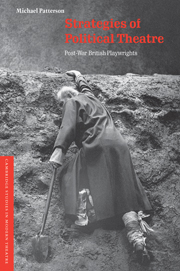Book contents
- Frontmatter
- Contents
- Acknowledgments
- Brief chronology, 1953–1989
- Introduction
- Part 1 Theory
- Part 2 Two model strategies
- Part 3 The reflectionist strain
- Part 4 The interventionist strain
- 7 Agit-prop revisited: John McGrath's The Cheviot, the Stag and the Black, Black Oil (1973)
- 8 Brecht revisited: David Hare's Fanshen (1975)
- 9 Rewriting Shakespeare: Edward Bond's Lear (1971)
- 10 The strategy of play: Caryl Churchill's Cloud Nine (1979)
- Conclusion
- Notes
- Select bibliography
- Index
8 - Brecht revisited: David Hare's Fanshen (1975)
Published online by Cambridge University Press: 22 September 2009
- Frontmatter
- Contents
- Acknowledgments
- Brief chronology, 1953–1989
- Introduction
- Part 1 Theory
- Part 2 Two model strategies
- Part 3 The reflectionist strain
- Part 4 The interventionist strain
- 7 Agit-prop revisited: John McGrath's The Cheviot, the Stag and the Black, Black Oil (1973)
- 8 Brecht revisited: David Hare's Fanshen (1975)
- 9 Rewriting Shakespeare: Edward Bond's Lear (1971)
- 10 The strategy of play: Caryl Churchill's Cloud Nine (1979)
- Conclusion
- Notes
- Select bibliography
- Index
Summary
The theatre is the best way of showing the gap between what is said and what is seen to be done, and that is why, ragged and gap-toothed as it is, it has still a far healthier potential than some of the other, poorer, abandoned arts.
David Hare's Fanshen is notable for two reasons: first, it was one of the earliest theatre pieces that was created by an author working with a group of actors on a non-dramatic text; secondly, it was one of the few examples of British political theatre that, instead of portraying the problems inherent in Western capitalism, looked towards the East for a positive alternative, in a manner and style reminiscent of the Prologue to Brecht's Caucasian Chalk Circle (1948).
Fanshen is not characteristic of David Hare's work. As a Cambridge graduate, something he shares with his frequent collaborator Howard Brenton, he tends to write about the milieu that he knows best: the world of privilege which has betrayed the hopes of progressive elements in society. Most of his early plays are set in middle-class or upper-middle-class settings. Slag (1970) is located in an exclusive girls' school, which is in steep decline and where the staff are unexpectedly radical but wholly ineffectual. In The Great Exhibition (1972) we find ourselves in the Hampstead home of a nominally Labour politician who cannot bear to travel to his grimy constituency in the North of England.
- Type
- Chapter
- Information
- Strategies of Political TheatrePost-War British Playwrights, pp. 125 - 137Publisher: Cambridge University PressPrint publication year: 2003



